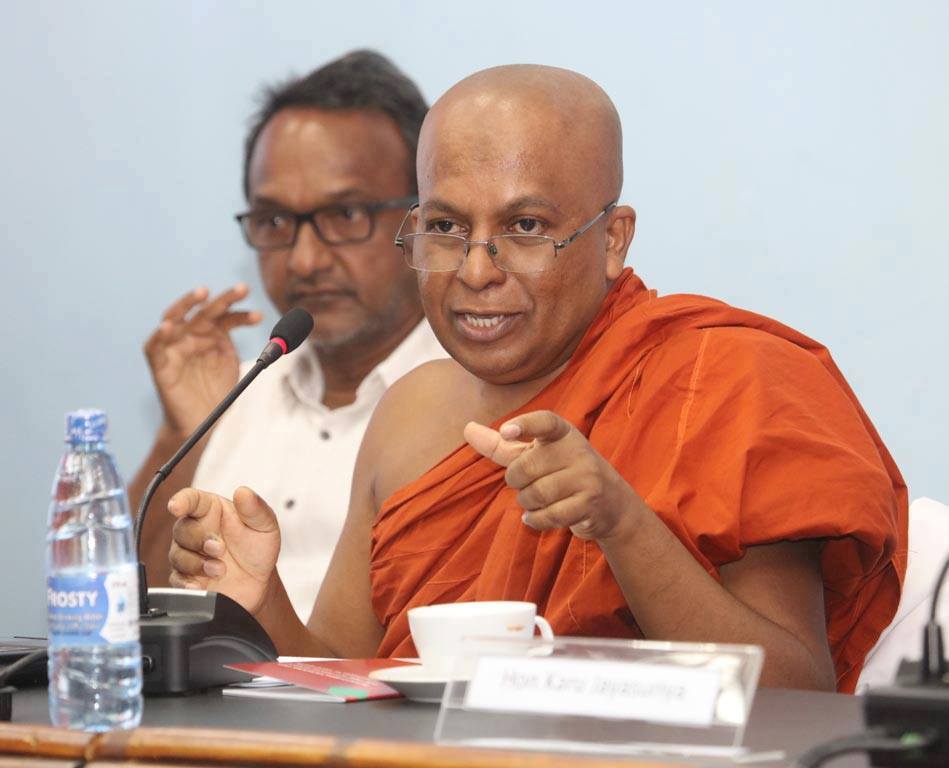A Brief Colonial History Of Ceylon(SriLanka)
Sri Lanka: One Island Two Nations
A Brief Colonial History Of Ceylon(SriLanka)
Sri Lanka: One Island Two Nations
(Full Story)
Search This Blog
Back to 500BC.
==========================
Thiranjala Weerasinghe sj.- One Island Two Nations
?????????????????????????????????????????????????Thursday, June 15, 2017
Buddhism & Good Governance: The Case For A Sangha Rebellion

“Buddha’s disciples were never a horde of uncivilized beggars“~ Max Weber, The Religion of India
Starting
with independence from British rule in 1948, mal governance in Sri
Lanka has been steadily on the increase and practised by both major
parties that came to power alternatively. Over time it has become
pervasive and systemic, and has now infected the society’s underlying
value system, bringing the society to the brink of disintegration known
as “anomie” in the literature of sociology. This paper is an account of
that dangerous decline and a call to the more progressive and ethically
sensitive sections of the saṅgha of
Sri Lanka to help the society regain its health by renouncing the
Sinhala Buddhist worldview that is at the root of the problem, and
living up to the noble teachings of their founder.
To
begin with, we must recognize the distinction between Buddhism as a set
of philosophical and ethical ideas, and Buddhism as it is popularly
understood and practised by its adherents. We can call the first
“Philosophical Buddhism” and the second “Cultural Buddhism”. Different
Buddhist societies have different Cultural Buddhisms such as Sinhala Buddhism,
Burmese Buddhism and Thai Buddhism. Philosophical Buddhism’s
universalist ethical system makes it a potentially powerful influence in
facilitating good governance and the rule of law. As reflected in the
earliest Buddhist literature and the principles of governance allegedly
followed by the paradigmatic Buddhist emperor Asoka, Philosophical
Buddhism also includes a general outlook of urbanity, civility and
modernity. Philosophical Buddhism thus defined is all good, but in
contrast, Cultural Buddhism is a mixed bag of good and bad. The bad, if
it gains the upper hand in any given society, can be detrimental to its
happiness, prosperity and well being. In Sri Lanka, it is unfortunately
the worldview of Sinhala Cultural Buddhism that has overwhelmingly taken
hold over the society, to the near exclusion of Philosophical Buddhism.
Our challenge therefore is to try and imbue the society with the
universalist ethicality of Philosophical Buddhism, and its ethos of
urbanity, civility and modernity; and, I am calling upon the more
educated and dynamic sections of the saṅgha to accept that challenge, and give leadership to a social movement for meeting it.
In
what follows, I try to show how Sinhala Cultural Buddhism’s worldview
has functioned to the detriment of the society of Sri Lanka when the
founding myth of its majority ethnic community was mistaken to be
history, and its relation with the political exceeded the boundary of
acceptability. This development, that we might call “politicization”,
consisting at the broadest level the exploitation of sentiments of
religion and ethnicity for political gain, gradually invaded the society
as a whole, its myriad mutations infecting the value system on which
the society’s health was anchored. The landmark event in which Sinhala
Cultural Buddhism’s worldview effectively intervened in politics in a
manner deleterious to the health of the society was the general election
of 1956 when the then ruling United National Party (UNP), a party of
western-acculturated upper class urban politicians was ousted by a party
led by a more “nationalist” bloc of the same urban class, but widely
supported by a rural middle class of the indigenous literati consisting
of Buddhist monks, vernacular teachers and indigenous physicians. Since
then it has been downhill for Sri Lanka as far as good governance, the
rule of law, and general civility are concerned. The increasing hegemony
of Sinhala Cultural Buddhism’s worldview over the society is the most
damaging development of its mixed bag of good and bad, giving the bad a
decisive upper hand.


 By
By 